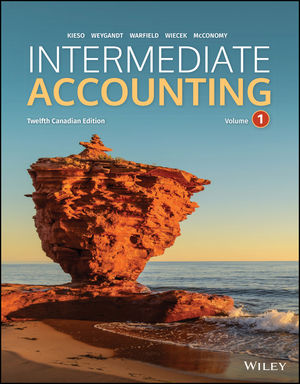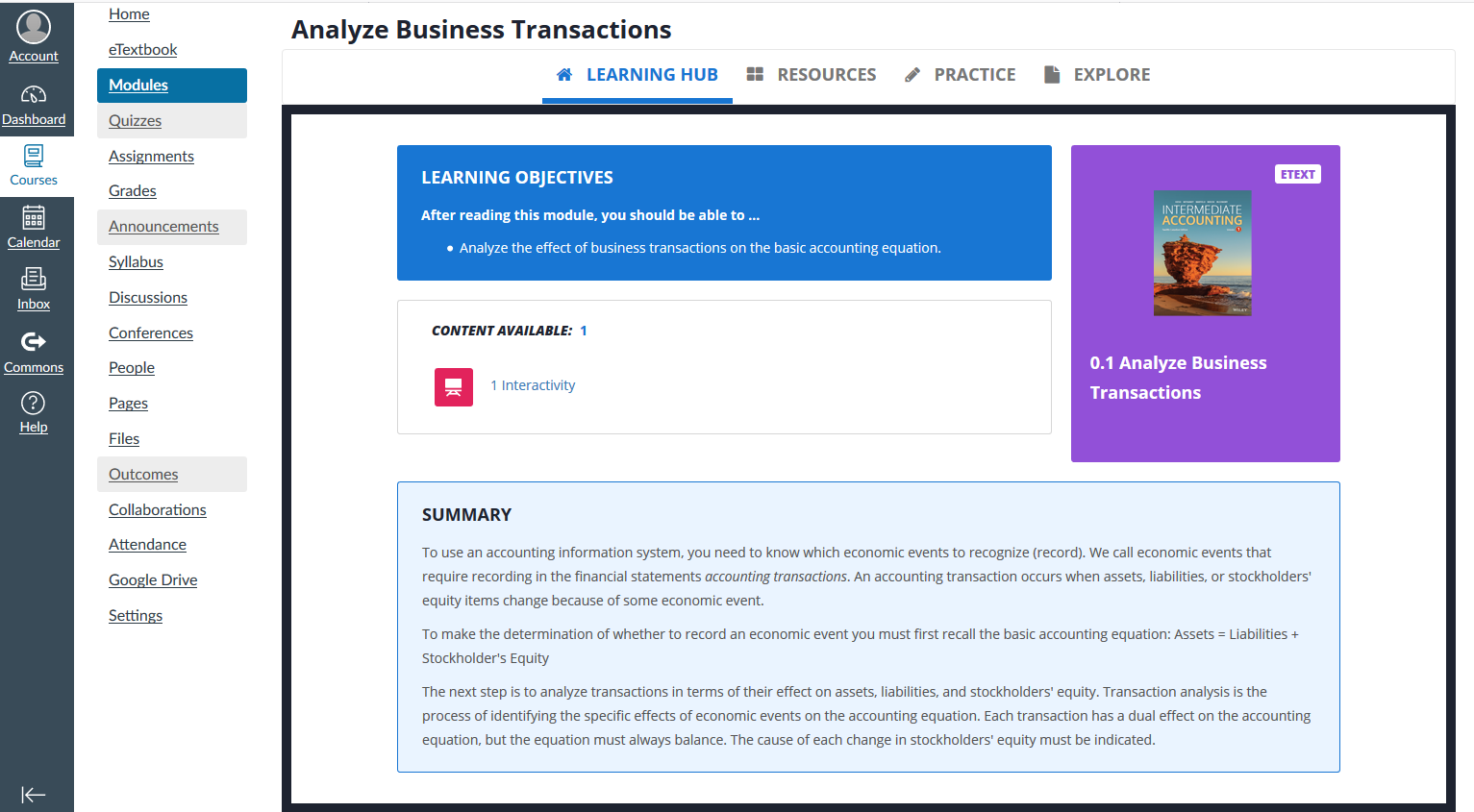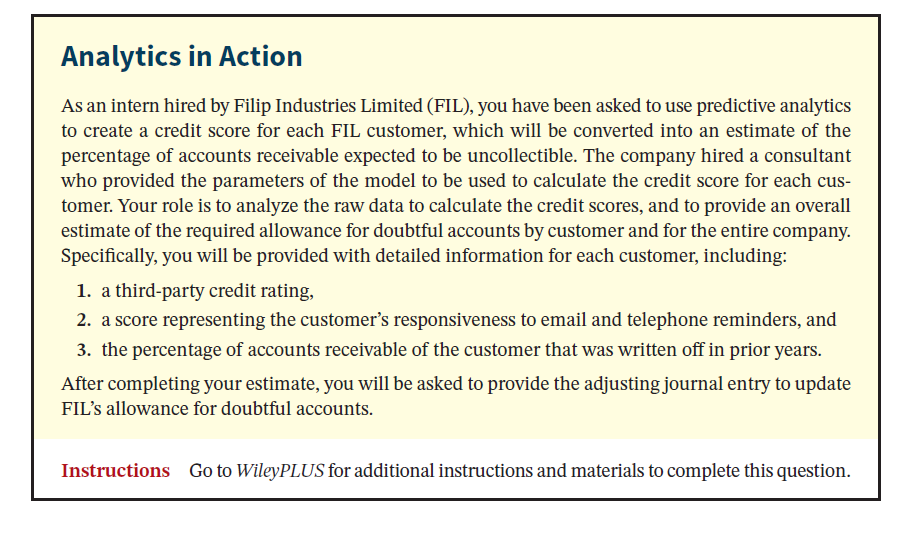
Intermediate Accounting, 12th Canadian Edition
By Donald E. Kieso, Jerry J. Weygandt, Terry D. Warfield, Irene M. Wiecek, Bruce J. McConomy
Intermediate Accounting, 12th Edition, continues to be the number one intermediate accounting resource in the Canadian market. Viewed as the most reliable resource by accounting students, faculty, and professionals, this course helps students understand, prepare, and use financial information by linking education with the real-world accounting environment. This new edition now incorporates new data analytics content and up-to-date coverage of leases and revenue recognition.
The next generation of WileyPLUS for Intermediate Accounting gives instructors the freedom and flexibility to tailor content and easily manage their course in order to keep students engaged and on track.
Schedule a Demo Sign Up for a Test Drive Adopt WileyPLUSWant to learn more about WileyPLUS? Click Here
Hear from our Authors

The Accounting Cycle Is Continually Reinforced
Assignable Chapter 0, a review of the accounting cycle, allows students to refresh their knowledge with reading content, interactive tutorials, and adaptive practice questions. Assignments are also available for exercises, brief exercises, and problems for both granular and comprehensive accounting cycle practice.
Videos Help Students Reinforce Concepts and Build Upon Their Skills
NEW author solution walkthrough lightboard videos offer 24/hour assistance for students. The videos align with end of chapter content and are available as question assistance as students work through problems in WileyPLUS.

New Data Analytics prepares students for the changing profession
To highlight examples where accounting information is used to support business decision making using data analytics, we have introduced a new Analytics in Action End of Chapter Activity. Students will work through online case analyses (with datasets) which illustrate within a realistic context how the accounting information studied in a particular chapter is relevant to predictive analytics.
- Easy Assessment: Algorithmic, multiple-choice test bank questions make student assessment simple to create and assign. All questions are tagged to Bloom’s Taxonomy, AACSB, AICPA, and CPA standards, allowing instructors and departments to quickly demonstrate outcomes, analyze student performance data, and make immediate improvements.
- Practice Made Simple: In addition to adaptive practice and learning objective level practice, end-of-chapter practice assignment includes additional exercises, brief exercises, and problems to ensure students have many opportunities for additional practice.
- Wiley Accounting Updates: News articles curated weekly provide students application-based understanding of how the topics relate to the real world. Each article is paired with several discussion questions to encourage students to think critically about the topic in relation to the course content.
- Video Library: Student have office hour videos and new light board videos for each chapter to review key problem-solving techniques from the authors and subject matter experts.
- Interactive Review of the Accounting Cycle. This assignable chapter 0 offers adaptive review and practice of each stage of the accounting cycle with reading content, exercises, and problems to provide additional opportunities for both granular and comprehensive accounting cycle practice. Additional interactive tutorials are also included.
- New Multimedia Resources. Authors, Irene Wiecek and Bruce McConomy have created new Lightboard Solution Walkthrough Videos: to help students solve problems similar to ones they will encounter in their homework assignments.
- New Analytics in Action. To highlight examples where accounting information is used to support business decision making using data analytics, we have introduced a new “Analytics in Action” end of chapter activity. Students will work through online case analyses (with datasets) which illustrate within a realistic context how the accounting information studied in a particular chapter is relevant to predictive analytics.
- Up-to-Date Coverage. Updated content for all recently effective standards (Ch 9 Investments and Ch 20 Leases) with extensive updates to the new “Conceptual Framework” requirements in Ch 2.
Features Include

Donald E. Kieso, Ph.D., CPA, received his bachelor’s degree from Aurora University and his doctorate in accounting from the University of Illinois. He has served as chairman of the Department of Accountancy and is currently the KPMG Emeritus Professor of Accountancy at Northern Illinois University. He has public accounting experience with Price Waterhouse & Co. (San Francisco and Chicago) and Arthur Andersen & Co. (Chicago) and research experience with the research division of the American Institute of Certified Public Accountants (New York). He has done post doctorate work as a visiting scholar at the University of California at Berkeley and is a recipient of NIU’s Teaching Excellence Award and four Golden Apple Teaching Awards. Kieso is the author of other accounting and business books and is a member of the American Accounting Association, the American Institute of Certified Public Accountants, and the Illinois CPA Society. He has served as a member of the board of directors of the Illinois CPA Society, the AACSB’s Accounting Accreditation Committees, and the State of Illinois Comptroller’s Commission, and he has served as secretary-treasurer of the Federation of Schools of Accountancy and as secretary-treasurer of the American Accounting Association. Kieso is currently serving on the board of trustees and executive committee of Aurora University, as a member of the board of directors of Kishwaukee Community Hospital, and as treasurer and director of Valley West Community Hospital. From 1989 to 1993, he served as a charter member of the national Accounting Education Change Commission. He is the recipient of the Outstanding Accounting Educator Award from the Illinois CPA Society, the FSA’s Joseph A. Silvoso Award of Merit, the NIU Foundation’s Humanitarian Award for Service to Higher Education, a Distinguished Service Award from the Illinois CPA Society, and in 2003, an honorary doctorate from Aurora University.

Terry D. Warfield, Ph.D., is the PwC Professor in Accounting at the University of Wisconsin-Madison. He received a B.S. and M.B.A. from Indiana University and a Ph.D. in accounting from the University of Iowa. Warfield’s area of expertise is financial reporting, and prior to his academic career, he worked in the banking industry for five years. He served as the Academic Accounting Fellow in the Office of the Chief Accountant at the U.S. Securities and Exchange Commission in Washington, D.C., from 1995–1996. Warfield’s primary research interests focus on financial accounting standards and disclosure policies. He has published scholarly articles in The Accounting Review, Journal of Accounting and Economics, Research in Accounting Regulation, and Accounting Horizons, and he has served on the editorial boards of The Accounting Review, Accounting Horizons, and Issues in Accounting Education. He has served as president of the Financial Accounting and Reporting Section, the Financial Accounting Standards Committee of the American Accounting Association (Chair 1995–1996), and on the AAAFASB Research Conference Committee. He also served on the Financial Accounting Standards Advisory Council of the Financial Accounting Standards Board, and he currently serves as a trustee of the Financial Accounting Foundation. Warfield has received teaching awards at both the University of Iowa and the University of Wisconsin, and he was named to the Teaching Academy at the University of Wisconsin in 1995. Warfield has developed and published several case studies based on his research for use in accounting classes. These cases have been selected for the AICPA Professor-Practitioner Case Development Program and have been published in Issues in Accounting Education. He served on the Board of the Illinois CPA Society and AACSB’s Accounting Accreditation Committees, was the State of Illinois Comptroller’s Commission, was secretary-treasurer of the Federation of Schools of Accountancy, and was secretary-treasurer of the American Accounting Association.

Irene M. Wiecek, FCPA, FCA, is a Professor of Accounting, Teaching Stream at the University of Toronto where she is cross-appointed to the Institute for Management & Innovation and the Joseph L. Rotman School of Management. She has taught financial reporting in various programs including the Commerce Program (Accounting Specialist) and the CPA-accredited Master of Management & Professional Accounting Program (MMPA). The director of the MMPA Program (previously associate director), she co-founded (in 2004) and was director of the CPA/Rotman Centre for Innovation in Accounting Education, which supported and facilitated innovation in accounting education until 2018. Irene has been involved in professional accounting education for over 25 years, sitting on various provincial and national professional accounting organization committees as well as developing and directing the CICA IFRS Immersion Programs for practising accountants. She was appointed a member of the E&Y Academic Resource Center where she helped to author a new IFRS curriculum for the Americas. In the area of standard setting, she has chaired the CAAA Financial Reporting Exposure Draft Response Committee and is currently a member of the IFRS Discussion Group (IDG). Irene co-authored the IFRS Primer: International GAAP Basics (Canadian and U.S. editions) and was the co-editor and contributor for the books Leveraging Change—The New Pillars of Accounting Education and Educating Professionals: Ethics and Judgment in a Changing Learning Environment. She co-authored the Guide to IFRS in Canada series, which is published by CPA Canada. Irene is on the editorial board for Accounting Perspectives.

Bruce J. McConomy, Ph.D., CPA, CA, is a professor of accounting at the Lazaridis School of Business and Economics, Wilfrid Laurier University in Waterloo, Ontario. He was a senior audit manager with Deloitte before returning to Queen’s University to obtain his Ph.D. in accounting. Bruce is director of the CPA Ontario Centre for Capital Markets and Behavioural Decision Making and director of the Graduate Diploma in Accounting program at Laurier. He has been teaching intermediate financial accounting since the mid-1990s to undergraduates and MBA students, and also teaches in Laurier’s Ph.D. in management program. Bruce has published articles in Contemporary Accounting Research, Journal of Accounting, Auditing and Finance, Journal of Business, Finance and Accounting, Accounting, Auditing & Accountability Journal, Canadian Journal of Administrative Sciences and Accounting Perspectives. He has also published cases in Issues in Accounting Education, Canadian Financial Accounting Cases—2nd edition, Accounting Perspectives and the Journal of Accounting Case Research. Bruce is an associate editor of Accounting Perspectives and is on the editorial board of the International Journal of Accounting & Information Management. Bruce has co-authored three editions of the Canadian edition of the Intermediate Accounting (Kieso, et. al.) including the upcoming 12th Canadian edition.
Volume 1
- The Canadian Financial Reporting Environment
- Conceptual Framework Underlying Financial Reporting
- Measurement
- Reporting Financial Performance
- Financial Position and Cash Flows
- Revenue Recognition
- Cash and Receivables
- Inventory
- Investments
- Property, Plant, and Equipment: Accounting Model Basics
- Depreciation, Impairment, and Disposition
- Intangible Assets and Goodwill
Volume 2
- Non-Financial and Current Liabilities
- Long-Term Financial Liabilities
- Shareholders’ Equity
- Complex Financial Instruments
- Earnings Per Share
- Income Taxes
- Pensions and Other Employee Future Benefits
- Leases
- Accounting Changes and Error Analysis
- Statement of Cash Flows
- Other Measurement and Disclosure Issues

